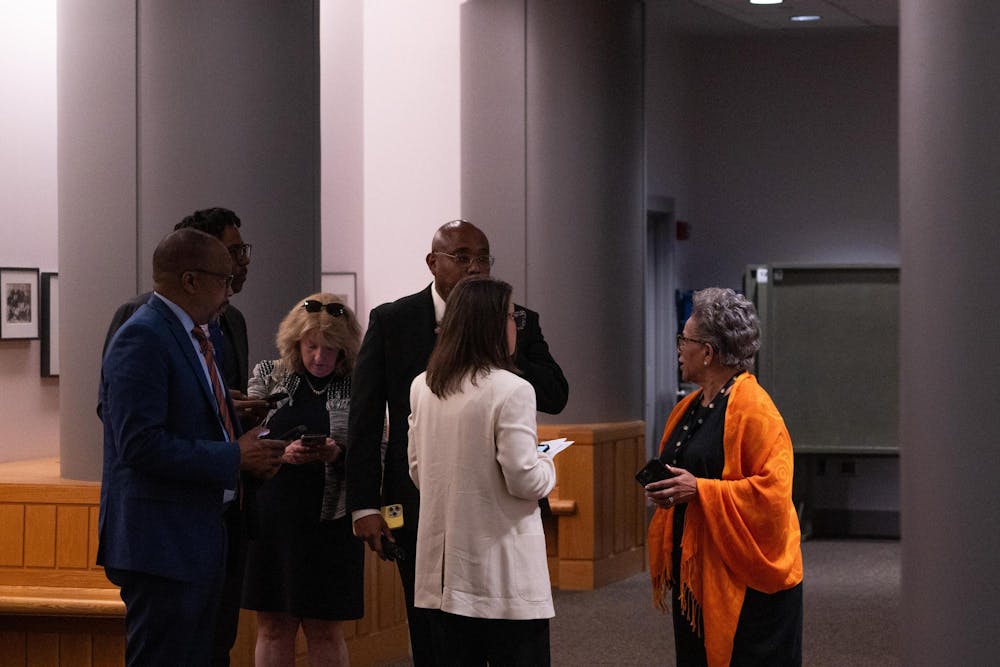Princeton has rolled out a new policy on recordings and photography that, as written, will dramatically curtail student ability to access University decision-making processes and further exacerbate the power disparity between students and administrators.
At the Council of the Princeton University Community (CPUC) meeting on Monday, Vice President for Campus Life Rochelle Calhoun unveiled a new policy on recording events that prohibits the recording of public events or meetings “when it has been explicitly stated that recording is prohibited,” and prohibits disseminating any such recordings.
With this policy, the University retreats even further from the democratization of its decision-making processes. At the meeting, University President Christopher Eisgruber ’83 did not rule out prohibiting the recording of CPUC meetings, saying he would defer to the body’s Executive Committee. Prohibiting the recording of CPUC and other public meetings would reduce the access of students, faculty, and staff to University policymaking.
In the words of my colleague Alex Norbrook ’26, this would destroy “transparency in one of the University’s few relatively accessible decision-making spaces.”
Student activists and others seeking change at the University have long relied on forums like CPUC as opportunities to question powerful figures on campus, including Eisgruber and Calhoun. But the CPUC is by nature closed to most students: for instance, there are fewer than 200 seats available in the audience, the meetings are not publicized except on the CPUC website, and the agendas are opaque. To know that today’s changes to recording policy were happening, for example, you’d have to infer them from one bullet point on the agenda, which read only “University Recording Policy [25 minutes].”
And while the ‘Prince’ will continue to cover CPUC meetings, the coverage inherently does not encapsulate the meeting in its entirety: For example, Sunrise Princeton asked two climate-related questions at the September meeting that did not make it into the coverage. As a result, the recording and dissemination of the answers we receive from top University brass — down to the exact word — is crucial for informing our members and the general public to prompt policy changes.
This is not all to mention the glaring threat to that very student journalism: If a writer for the ‘Prince’ wishes to record a CPUC meeting, which “might otherwise be construed as public,” are administrators empowered to prohibit them from doing so, and discipline them if they do?
Moreover, many crucial elements of the policy remain opaque, although it has been ostensibly enacted. It’s not clear when exactly this prohibition takes effect, nor what kinds of penalties it will entail.

For example, one “exception” to the rule of unanimous consent appears to be when recording is “authorized by a meeting chair.” That could mean that, in a meeting convened by a University administrator with a group of students, the administrator has discretion to permit recording in the meeting, regardless of whether the students consents to the recording, but the students cannot record unless all participants consent.
This would further upset an already unbalanced power arrangement between the University and students. It would hand complete control over recording authorization to administrators, allowing them to decide when they can be held accountable and when they cannot.
This is all in spite of the fact that New Jersey is a one-party consent state, meaning that it is legal to record so long as one — just one — person in the room consents to it being done.
In a time when dissent is repressed and journalism is dying, it is more essential than ever to protect and promote the free flow of ideas and information, the dissemination of truth, and the value of political disagreement. Princeton’s new recording policy harms all three.

In his remarks to the Class of 2029, Eisgruber said that “the free exchange of ideas is essential to the pursuit of truth.” Prohibiting recordings in this fashion will damage the campus discourse, allowing administrators to limit who gets to access those politics to a small group of particularly engaged students. In doing so, truth may be distorted, as the campus will come to rely on second or third hand recountings instead of objective recordings.
This authoritarian policy undermines the possibility of a democratic University community and is the latest step toward fully stripping CPUC meetings of transparency and open debate. For truth, ideas, and dissent — for the record — the University must allow us to record.
Isaac Barsoum ’28 is a prospective Politics major from Charlotte, N.C. who nearly failed his MAT104 problem set to write this column. You can read his column here. You can reach him at itbarsoum[at]princeton.edu.








